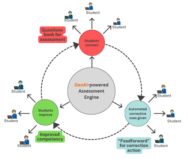
Designing AI-Resistant Assignments in Educational Leadership Courses
When I began teaching graduate-level courses in educational leadership early in the COVID-19 pandemic, my classroom existed entirely online. I quickly learned that keeping students


When I began teaching graduate-level courses in educational leadership early in the COVID-19 pandemic, my classroom existed entirely online. I quickly learned that keeping students

As the term draws to a close, students are not the only ones counting the weeks left. Instructors, too, often feel a mix of relief

Working in the College of Interdisciplinary Studies has shown me firsthand that our students face a world full of messy, tangled problems. Climate shifts, health

A defining quality of student-centred teaching is effective assessments. In recent years, the discourse around effective assessment has steered towards incorporating the “assessment for learning”

Curriculum assessment and evaluation projects may not always spark immediate enthusiasm, but a recent well-organized team project in our higher education program demonstrated the power

Keeping students engaged in course content is a challenge for all faculty, whether a legacy online teaching pro or a newbie to this space. Perhaps
Measuring student success is a top priority to ensure the best possible student outcomes. Through the years instructors have implemented new and creative strategies to assess student learning in both traditional and online higher education classrooms. Assessments can range from formative assessments, which monitor student learning with quick, efficient, and frequent checks on learning; to summative assessments, which evaluate student learning with “high stakes” exams, projects, and papers at the end of a unit or term.
It is only a slight exaggeration to say that resistance to educational assessment comes from almost as many different sources as there are assessment tools, but in the end the reasons usually all boil down to three main issues:
Stronger than multiple choice, yet not quite as revealing (or time consuming to grade) as the essay question, the short answer question offers a great middle ground – the chance to measure a student’s brief composition of facts, concepts, and attitudes in a paragraph or less.
It’s a new year, but the same old challenges exist. Given today’s financial challenges, colleges and universities are all working harder than ever to be careful stewards of limited resources and to demonstrate their effectiveness to stakeholders, constituents, and the public.
Get exclusive access to programs, reports, podcast episodes, articles, and more!